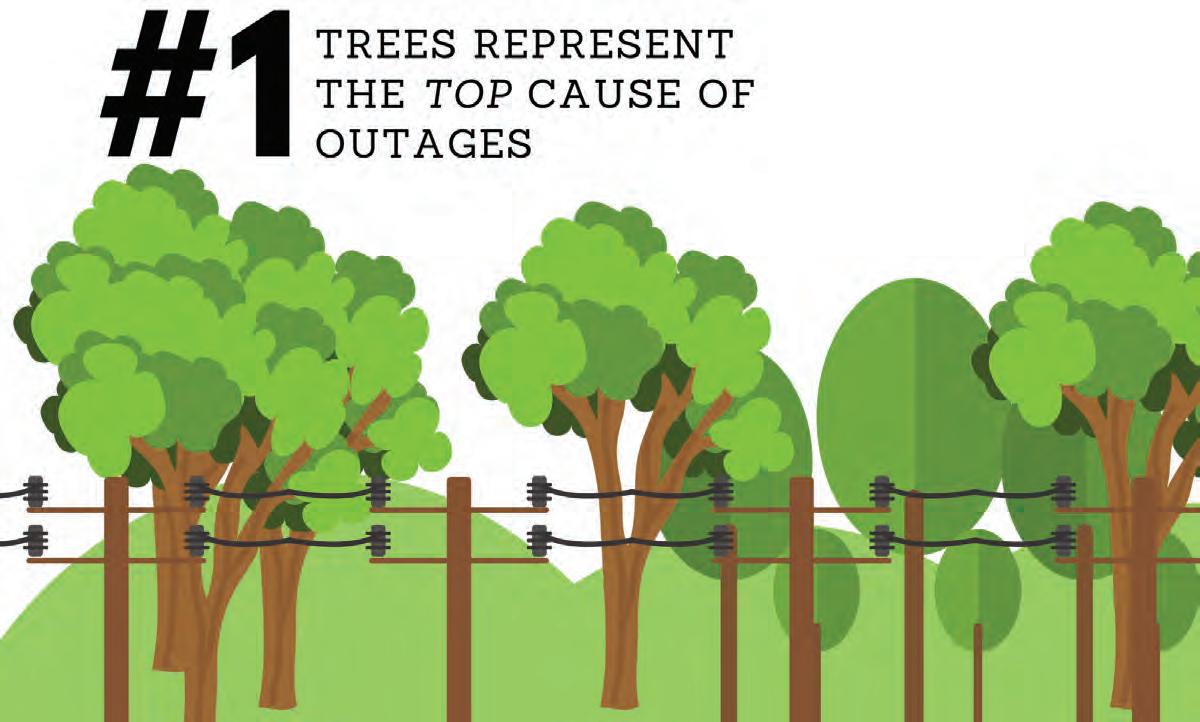Membership
MATTERS
Keeping costs low
Why Beat The Peak?
With power costs rising, Blue Ridge Energy is looking at all the ways to control costs. An important way members can join us in this effort is by signing up and taking action to Beat The Peak.

Peaks are the short periods of time on the hottest summer afternoons or coldest winter mornings when the most electricity is being consumed. Power producers must generate enough electricity to meet that extreme demand. In our area, peaks usually occur between 2-7 p.m., on the hottest summer weekdays and from 6–9 a.m. on the coldest winter mornings.
When you sign up for Beat The Peak, you’ll receive your choice of a text or email letting you know when a peak period is expected. Then, you can choose to take action to help “Beat The Peak” by shifting some of your electricity consumption outside of peak hours. Steps such as adjusting your thermostat, turning off unnecessary lights, and delaying laundry until after the peak are examples of simple but helpful steps members can take.
If members voluntarily reduce their electricity usage during peak demand times, it can make a big difference in controlling expensive wholesale power costs to keep rates — and bills — low.
Sign up today! It’s free and voluntary. Learn more or sign up at BlueRidge Energy.com/BTP. Or simply text “btp” to 70216 to sign up.
Teachers: Apply now for Bright Ideas grants!
Teachers in K-12 classrooms with innovative ideas for creative learning projects can find and submit an application by visiting ncbrightideas.com. The deadline is Sept. 15 and winners are announced in November. Blue Ridge Energy will provide up to $25,000 to fund Bright Ideas grants in the cooperative’s service area! Individual grants are awarded at a maximum of $2,000.
Bright Ideas grants are designed to fund innovative classroom projects that benefit students and would not otherwise be funded by regular school budgets.
Threats to Reliability, Cost: Looking out for your best interests

As a member-owned cooperative, our top priority is providing our members with affordable, reliable electricity. Today, there is a growing threat that could impact these basic needs for you and all electric consumers in North Carolina and across the nation energy policy that is going too far, too fast in the transition to renewables.

During the past year, we have been sounding the alarm.
Locally, the NC Energy Solutions Act (HB951) calling for a 70 percent carbon reduction by 2030-32 is driving concern for us. As we review the plans being established to meet this law by Duke Energy, our wholesale power provider that we purchase electricity from to provide to our members, we have grown increasingly concerned about reliability and affordability.
On a federal level, the Federal Energy Regulatory Commission (FERC) has warned that the nation is facing unprecedented challenges to the reliability of the electric power system. FERC Commissioner Mark Christie noted the problem is not adding wind, solar and other renewable resources, but rather the subtraction of resources and power plants that can quickly adjust power output to consumer needs. The core problem, he said, is simple: “We’re retiring dispatchable generating resources (such as coal and gas) at a pace and in an amount that is far too fast and far
too great and is threatening our ability to keep the lights on.”
This will have significant impacts on the reliability and security of the electric grid, as well as challenging economic impacts on consumers.
An example of what can occur is the wake-up call the Carolinas experienced on Christmas Eve 2022. That was the first time ever, we, and many other utilities, received emergency requests from Duke Energy to start temporary rolling outages or blackouts, in order to protect the grid and have enough power to get through that extremely cold period. Winter Storm Elliott had caused sustained low temperatures over the entire region and power generators found themselves lacking adequate generation fuels to power the extreme demand for heating. It is a situation that could have been much worse.
The answer? An “all of the above” approach using all available resources, including coal, gas and nuclear, along with renewables, will work best to keep power reliable AND affordable. In looking out for our members and communities, we are asking policymakers to ensure all power generation resources are available. We will keep you informed about these efforts and movement on a state and federal level as we continue with our top priority: Working to provide you with the most reliable electricity at the most affordable cost.
What is the No. 1 cause of outages?
If you answered this question by saying trees coming into contact with power lines, you would be right! In fact, trees and other vegetation, such as vines or shrubbery, contribute to over half of our outage time.

That’s why your cooperative has a dedicated, year-round vegetation management program, overseen by two certified arborists, to help protect electric reliability across 8,300 miles of power lines on the Blue Ridge Energy system. Balancing reliability with the beauty of scenic western North Carolina is also important.
Keeping trees away from power lines is an important safety precaution. Trees and other objects that come into contact with power lines can become energized, leading to shock or electrocution. Even fallen power lines can still be energized, which is why no
one but our line technicians should ever go near a downed power line. A clear path for power lines creates a safer working environment for line technicians, whether they’re performing routine maintenance or power restoration.
Members can help by avoiding planting trees and large growing vegetation near power lines. For existing trees that are directly in the cooperative’s rights-of-way, Blue Ridge Energy helps with removal and also with replacement by giving members a voucher for a low-growing species at local, approved nurseries. Vouchers may also apply to a larger tree that is planted farther from rights-ofway.
For more, contact Blue Ridge Energy or visit BlueRidgeEnergy.com/ROW
How to lower summer energy bills
Costs for cooling your home can make up a large portion of your summer electric bills. We work to provide members with the lowest cost of electricity! These tips can help keep your bills lower:
No-Cost Tips
• Close blinds and drapes during the day to keep heat out.
• Set your thermostat as high as comfortable when you’re home (and higher when you’re away or during a Beat The Peak alert period).
• Turn off lights and ceiling fans when you leave a room.
Board update
• Air dry dishes and clothes.
• Use a microwave instead of your range or oven. Or grill outdoors!
Low-Cost Tips
• Plant trees and shrubs that shade the exterior of your home in summer.
• Replace disposable air filters monthly (or according to your manufacturer’s guidelines).
• Use solar lighting to brighten up walkways.
• Replace light bulbs with LED versions.
Nearly 6,000 members voted in this year’s director elections, thanks to the convenient options of voting by mail or internet. Members could also vote at the cooperative’s corporate office in Lenoir during the annual meeting held on June 22.
Directors elected to serve three-year terms were: David Eggers, Caldwell district; Tom Trexler, Watauga district; David Boone, Ashe district; and John F. “Johnny” Wishon, Alleghany district.
Updates of annual meeting reports are online at BlueRidgeEnergy.com
At their regular June meeting, your Board of Directors elected the following board officers: Jeff Joines, president; Johnny Wishon, vice-president; Kelly Melton, secretary-treasurer; and J.B. Lawrence, assistant secretary-treasurer.
